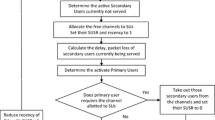Abstract
Cognitive Radio Network is an emerging popular wireless network, designed for efficient spectrum utilization. It enables unlicensed users to access the unused portion of the licensed spectrum opportunistically. The major challenge is to share the unused portion of the spectrum efficiently to the unlicensed users. Channel aggregation is an interesting approach by which channels can be grouped and allocated to unlicensed users. A combined Round Robin Priority (RRP) scheduling algorithm is proposed by which the starvation of low priority SUs are minimized and QoS parameters are better compared to the traditional static and dynamic channel aggregation method. Fuzzy Inference System is used to evaluate the priority of the Secondary User. The QoS parameters utilized for comparison are spectrum utilization, capacity of the secondary network, delay, blocking probability and forced termination probability.












Similar content being viewed by others
References
Masonta, M.T., Mzyece, M., Ntlatlapa, N.: Spectrum decision in cognitive radio networks: a survey. IEEE Commun. Surv. Tutor. 15(3), 1088–1110, Third quarter (2013)
Ren, P., Wang, Y., Du, Q., Xu, J.: A survey on dynamic spectrum access protocols for distributed cognitive wireless networks. EURASIP J. Wirel. Commun. Netw. 60 (2012). https://doi.org/10.1186/1687-1499-2012-60
Mitola, J., Maguire, G.Q.: Cognitive radio: making software radios more personal. IEEE Pers. Commun. 6(4), 13–18 (1999)
Attar, A., Nakhai, M., Aghvami, A.: Cognitive radio game: a frame-work for efficiency, fairness and QoS guarantee. In: Proceedings of ICC, 2008, pp. 4170–4174 (2008)
Azarfar, A., Frigon, J.-F., Sans‘o, B.: Analysis of cognitive radio networks based on a queueing model with server interruptions. In: Proceedings of IEEE International Conference on Communications, ICC 2012, pp. 1703–1708, June (2012)
Akyildiz, I.F., Lee, W.-Y., Chowdhury, K.R.: CRAHNs: cognitive radio ad hoc networks. Ad Hoc Netw. 7(5), 819–836 (2009)
Di Benedetto, M.-G., Cattoni, A., Fiorina, J., Bader, F., De Nardis, L.: Cognitive Radio and Networking for Heterogeneous Wireless Networks. Springer Press (2015)
Monemi, M., Rasti, M., Hossain, E.: On joint power and admission control in underlay cellular cognitive radio networks. IEEE Trans. Wirel. 14(1), 265–278 (2015)
Fakhrudeen, A.M., Alani, O.Y.: Spectrum improvement in cognitive radio network: survey. In: Proceeding of Annual Postgraduate Symposium on the Convergence of Telecommunications, Networking and Broadcasting (PGNet2014), June 23–24, pp. 119–124 (2014)
Vassaki, S., Panagopoulos, A.D., Constantinou, P.: Evaluation of channel dependent bandwidth allocation in wireless access networks: centralized and distributed approach. Telecommun. Syst. 52(4), 2003–2013 (2013)
IEEE 802.22 Wireless Regional Area Network. [Online]. Available: http://www.ieee802.org/22/
Jiao, L., Pla, V., Li, F.Y.: Analysis on channel bonding/aggregation for multi-channel cognitive radio network. In: Proc. European Wireless (EW), Lucca, Italy, Apr. (2010)
Liu, S., Lazos, L., Krunz, M.: Cluster-based control channel allocation in opportunistic cognitive radio networks. IEEE Trans. MobComput. 11(10), 1436–1449 (2012)
Hani, M.B., Salameh, H.B., Jararweh, Y., Bousselham, A.: Trafficaware self-coexistence management in IEEE 802.22 WRAN systems. In: Proceedings of the 7th IEEE GCC Conference, November 2013, pp. 507–510 (2013)
Gowrishankar, K., Chandrasekar, C., Kaniezhil, R.: Maximum possibility of spectrum access in cognitive radio using fuzzy logic system. Int. J. Eng. Res. Appl. 2(4), 1408–1415 (2012)
Salameh, H.B.: Efficient resource allocation for multicell heterogeneous cognitive networks with varying spectrum availability. IEEE Trans. Veh. Technol. 65(8), 6628–6635 (2016)
Kaur, P., Khosla, A., Uddin, M.: Markovian queuing model for dynamic spectrum allocation in centralized architecture for cognitive radios. IACSIT Int. J. Eng. Technol. 3(1), Feb. (2011)
Jiao, L., Li, F.Y., Pla, V.: Modeling and performance analysis of channel assembling in multi-channel cognitive radio networks with spectrum adaptation. IEEE Trans. Vehicular Technol. 61(6), 2686–2697 (2012)
Tang, S., Mark, B.L.: Performance of a cognitive radio network with tolerable service degradation. In: Proc. Int. Workshop on Design of Reliable Communications Networks (DRCN’09), Alexandria, VA, USA, Oct. (2009)
Balapuwaduge, I.A.M., Jiao, L., Pla, V., Li, F.Y.: Channel assembling with priority-based queues in cognitive radio networks: strategies and performance evaluation. IEEE Trans. Wirel. Commun. 13(2), 630–645 (2014)
Zhao, Y., jin, S., Yue, W.: Performance analysis of Cognitive Radio Networks for Secondary Users with slotted central control. J. Telecommun. Syst. April (2017). https://doi.org/10.1007/s11235-017-0313-4
Uyanik, G.S., Oktug, S.: Cognitive channel selection and scheduling for multi-channel dynamic spectrum access networks considering QoS levels. Ad Hoc Netw. (2017). https://doi.org/10.1016/j.adhoc.2017.04.003
Abdul Maksoud, I.A., Rabia, S.I., Algundi, M.A.: A discrete-time multi-server queuing model for opportunistic spectrum access systems. Perform. Eval. (2016). https://doi.org/10.1016/j.peva.2016.12.003
Zhang, W., Liu, X.: Centralized dynamic spectrum allocation in cognitive radio networks based on fuzzy logic and Q-learning. China Commun. 8(7), 46–54 (2011)
Cheung, M.H., Mohsenian-Rad, A.H., Wong, V.W.S., Schober, R.: Random access for elastic and inelastic traffic in WLANs. IEEE Trans. Wirel. Commun. 9(6), 1861–1866 (2010)
Yaiche, H., Mazumdar, R.R., Rosenberg, C.: A game theoretic framework for bandwidth allocation and pricing in broadband networks. IEEE/ACM Trans. Netw. 8(5), 667–678 (2000)
Han, W., Li, J., Tian, Z., Zhang, Y.: Dynamic sensing strategies for efficient spectrum utilization in cognitive radio networks. IEEE Trans. Wirel. Commun. 10(11), 3644–3655 (2011)
Author information
Authors and Affiliations
Corresponding author
Rights and permissions
About this article
Cite this article
Suganthi, N., Meenakshi, S. An efficient scheduling algorithm using queuing system to minimize starvation of non-real-time secondary users in Cognitive Radio Network. Cluster Comput 25, 1–11 (2022). https://doi.org/10.1007/s10586-017-1595-8
Received:
Revised:
Accepted:
Published:
Issue Date:
DOI: https://doi.org/10.1007/s10586-017-1595-8




